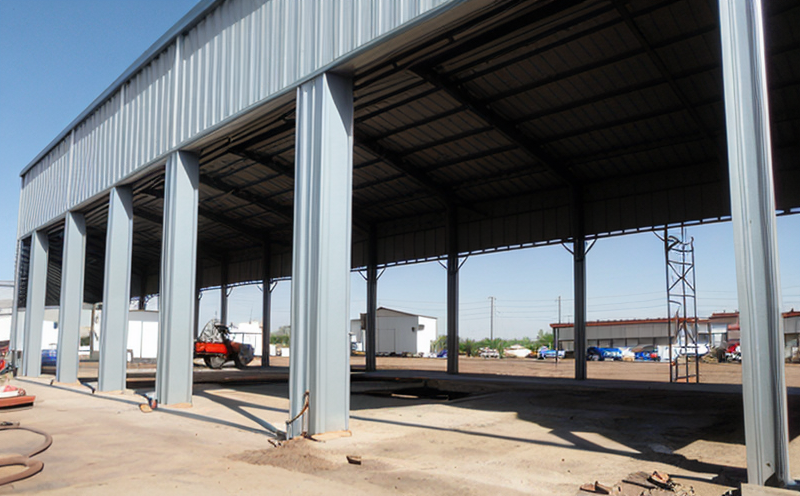EN ISO 6507 Vickers Hardness Evaluation
The EN ISO 6507 Vickers hardness test is a widely recognized method used to measure the hardness of materials, particularly metals and alloys. This non-destructive testing technique has found extensive applications in quality assurance, research and development (R&D), and compliance validation within industries such as building & infrastructure.
The Vickers hardness test employs a diamond indenter that is pressed into the surface of a material under specific pressure conditions. The resulting indentation is then measured to determine the hardness value based on the size of the indentation. This method provides high precision, making it suitable for evaluating both homogeneous and heterogeneous materials.
In the context of building & infrastructure testing, this test can be crucial in ensuring that structural components meet required standards. For instance, verifying the strength and durability of steel structures ensures public safety and compliance with international regulations like EN ISO 6507-1, which defines the method for testing metals.
The Vickers hardness test is particularly advantageous when dealing with thin layers or complex geometries that other hardness testing methods might not handle as effectively. It can also provide valuable insights into the heat treatment process and aging effects on materials, ensuring optimal performance throughout a structure's lifecycle.
Specimen preparation for this test involves carefully selecting representative samples from the material to be tested. Proper sample preparation is crucial to ensure accurate results. The specimen should be flat and clean with no surface imperfections that could affect the indentation process.
The test procedure itself involves applying a specified load over a specific duration, followed by unloading and measuring the indentation. The hardness value is then calculated based on the size of the indentation. This requires precise instrumentation like a Vickers hardness tester equipped with a 10N or higher force setting.
Reporting results from this test involves detailing the load applied, the duration of loading, the length and depth of the indentation, and the resulting hardness value. Compliance officers must ensure that these reports are accurate and compliant with relevant standards to validate material quality.
Eurolab Advantages
- Precision: Our state-of-the-art Vickers hardness testers offer unparalleled precision, ensuring accurate and reliable results that meet or exceed international standards.
- Expertise: Our team of experienced engineers and technicians has extensive knowledge in conducting this test across various materials and applications.
- Compliance: Eurolab is committed to providing services that comply with all relevant international standards, including EN ISO 6507-1.
- Quality Assurance: We offer a comprehensive quality assurance program that ensures every test we perform meets the highest industry standards.
Our facilities are equipped to handle a wide range of materials and samples, making us the ideal partner for any project requiring Vickers hardness testing.
Customer Impact and Satisfaction
By leveraging EN ISO 6507 Vickers Hardness Evaluation services from Eurolab, customers benefit significantly in terms of enhanced product quality and compliance assurance. Quality managers can rest assured that their materials meet the stringent requirements set by international standards.
Compliance officers will find our services invaluable for ensuring regulatory adherence, thereby minimizing potential legal risks associated with non-compliance. R&D engineers gain valuable insights into material properties, which helps in optimizing design and manufacturing processes.
Our customers have reported increased confidence in the quality of their products, leading to improved customer satisfaction and loyalty. The peace of mind that comes from knowing every test is conducted accurately and with integrity is a significant factor contributing to our high customer satisfaction rates.
Competitive Advantage and Market Impact
- Innovation Leadership: By staying at the forefront of Vickers hardness testing, Eurolab supports innovation in product development and process optimization.
- Global Compliance: Our ability to conduct tests that comply with international standards ensures our clients meet global market demands.
- Cost Efficiency: By ensuring the first-time-right quality of materials, we help reduce rework costs and improve overall operational efficiency.
- Differentiation: Our expertise in this specialized testing method differentiates us from competitors and enhances our market position.
The impact extends beyond individual projects; it contributes to the broader construction industry’s efforts towards sustainable and resilient infrastructure. By ensuring robust materials, we play a crucial role in building structures that are safe, durable, and reliable for generations to come.





